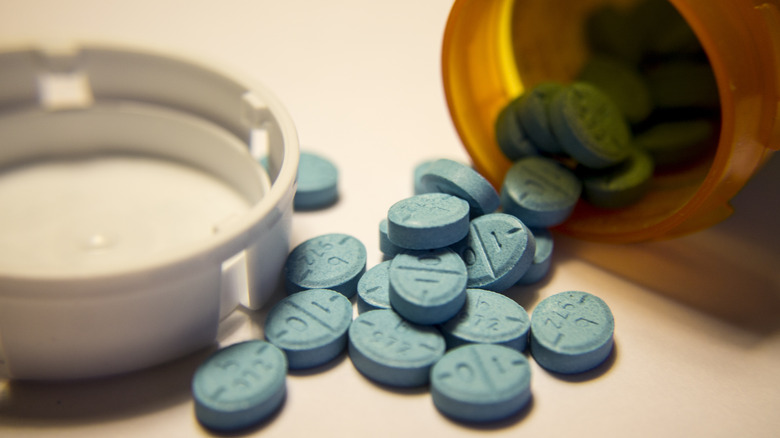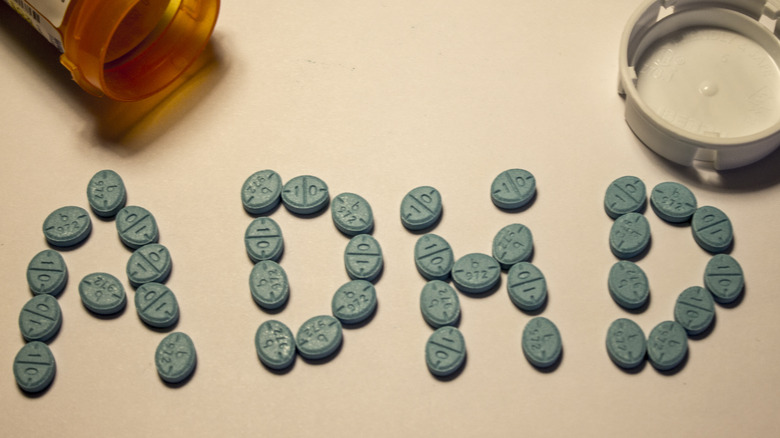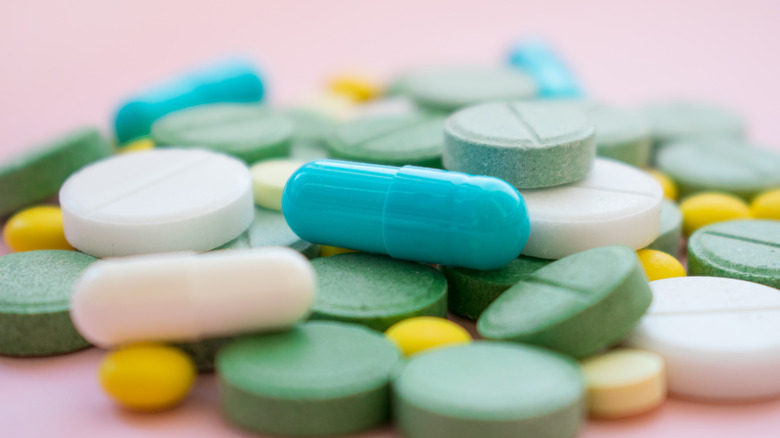Surprising Side Effects Of Adderall
Attention deficit hyperactivity disorder (ADHD) is often misunderstood. Inaccurate media portrayals give a limited impression of the condition, while many assume that someone only has ADHD if they exhibit specific, limited behaviors. This leads to people dismissing the condition as "kids being kids" or an excuse for people they deem lazy, flighty, or awkward. And, as the CDC explains, these misunderstandings get worse as people with ADHD grow up because symptoms in adults can look wildly different.
Adderall, a drug used to treat ADHD, is also frequently misunderstood. The prescription medication is a combination of amphetamine and dextroamphetamine. If either of those names sounds familiar, it's because they are part of what goes into street drugs like speed (via Amphetamines.com). However, Adderall does have very specific medical uses. It triggers the release of dopamine and norepinephrine in the brain, two chemicals that researchers think are lacking in people with ADHD (via Insider). When someone has ADHD, this release leads to improved focus and energy levels. In someone without ADHD, it can lead to an exaggerated level of productivity and energy with seriously dangerous consequences down the line.
Side effects of prescribed Adderall
An inability to cope with stress, an inability to multitask, poor organization, and frequent mood swings can also be signs of ADHD. And the use of Adderall can address almost all of these symptoms (via Mayo Clinic). When the medication triggers the release of dopamine and norepinephrine, it makes it easier for the person to complete tasks, thereby reducing their stress and giving them more energy for emotional regulation.
And this is incredibly helpful. It can allow people with ADHD to live happier lives. But it is not without side effects. Women's Health reports that people with longstanding prescriptions report issues like insomnia and a decreased appetite that comes back two-fold when their medication wears off. Adderall can also spike both your heart rate and your blood pressure, which can, in turn, lead to kidney issues. This is why the drug should only be used under medical guidance.
Adderall misuse
Taken under a doctor's supervision, Adderall's side effects are fairly easy to manage. The same cannot be said, however, of the side effects of Adderall misuse. Johns Hopkins breaks down the Adderall misuse trend as covered in a 2016 report, specifying that roughly 60% of non-prescription Adderall use occurs in college students who think it is a risk-free study aid.
There is a risk to abusing Adderall, however. In addition to the increase in blood pressure and the associated risk to the kidneys, Adderall can also aggravate issues like depression, anxiety, irritability, and lethargy according to American Addiction Centers. This can extend to suicidal ideation and paranoia if the drug is misused long enough, in addition to a lack of motivation when the person isn't on Adderall.
More troubling yet is that not all Adderall misuse is limited to its use as a study aid. Puget Sound Recovery Centers has a page dedicated to another, possibly even more dangerous, use of the drug as a weight-loss aid. Adderall increases the presence of epinephrine in the brain, which acts as an appetite suppressant. This coupled with additional energy means that a person will eat less and potentially move more, burning stored calories (via Women's Health). This isn't healthy, however, and is closer to an eating disorder than a sustainable weight loss program.
If you or anyone you know is struggling with addiction issues, help is available. Visit the Substance Abuse and Mental Health Services Administration website or contact SAMHSA's National Helpline at 1-800-662-HELP (4357).



